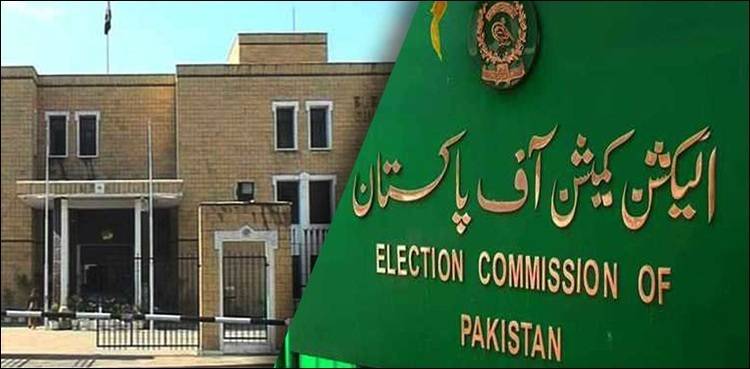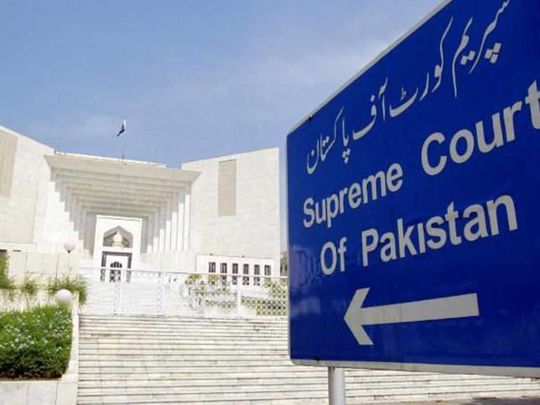Islamabad, the Election Commission of Pakistan (ECP) decided against allocating reserved seats to the PTI-backed Sunni Ittehad Council (SIC) due to “non-curable legal defects” and violation of mandatory provisions. As a result, the PTI has chosen to appeal to the Supreme Court against the 4-1 decision made by the election watchdog. This announcement coincided with the acceptance of nomination papers for the presidential elections, featuring candidates backed by the ruling coalition (PPP’s Asif Ali Zardari) and PTI (PkMAP’s Mahmood Khan Achakzai). The final list of eligible candidates will be released on March 5, with the option for nominees to withdraw until March 6. The ECP’s decision was based on a 22-page judgment, which concluded that the SIC was not entitled to claim the quota for reserved seats due to provisions in Article 51(6) and Section 104 of the Elections Act, 2017.
The Election Commission of Pakistan (ECP) denied the Sindh Industrial and Traders’ Wing’s (SITW) plea because the party failed to submit a list for reserved seats on time. As a result, the commission will distribute the vacant seats proportionally among other parties. One member expressed dissent. The nomination papers of Zardari and Achakzai were accepted. The PTI, however, has rejected the decision, calling it “unconstitutional” and against democracy, and has demanded the postponement of Senate and presidential elections. In addition, the Election Commission of Pakistan (ECP) decided to distribute the vacant seats among other parliamentary parties, with the PML-N and PPP seemingly set to benefit if the decision is not overturned by the Supreme Court.

The commission instructed, “The seats in the National Assembly shall not remain vacant and will be allocated by the proportional representation process of political parties on the basis of seats won by political parties. The office is directed to calculate the quota accordingly.” However, the seat-sharing formula remains unclear, making the distribution process particularly challenging in Khyber Pakhtunkhwa (KP), where PTI-backed independents secured 91 out of 115 general seats, while other parties failed to reach double-digit representation.
ECP member Babar Hassan Bharwana from Punjab dissented from the decision to distribute the vacant seats among different political parties. In his dissenting note, Bharwana agreed that the reserved seats could not be allocated to the Sunni Ittehad Council (SIC) due to their failure to submit their priority in time, as required by law. However, he suggested that the seats should remain vacant until amendments to Articles 51(6-d) and 106(3-c) are made. These articles state that reserved seats will be allocated to political parties based on their total number of general seats in national and provincial assemblies.
The Election Commission of Pakistan (ECP) order noted that the SIC was a registered political party but did not participate in the general election as a registered entity. SIC leader Hamid Raza contested as an independent candidate instead. The ECP order also mentioned that the SIC did not submit the required list to the commission, indicating a lack of interest in contesting the election as a political party or claiming reserved seats. The ECP referred to an argument made by the SIC counsel, who cited the example of the Balochistan Awami Party (BAP) regarding the allocation of reserved seats in the KP Assembly in 2019. However, the counsel failed to provide supporting documents for his claims.
According to the ECP, Article 51(6) of the Constitution states that seats will be allocated to political parties that contested the election and won general seats in the assembly. Seats reserved for women and non-Muslims will be allocated through a proportional representation system. The order also referred to a Supreme Court judgment emphasizing the mandatory nature of provisions, even if no penalty is prescribed for non-compliance. Section 104 of the Elections Act, 2017, requires political parties to file a separate list for reserved seats within a fixed period by the commission.
The PTI strongly condemned the Election Commission of Pakistan’s (ECP) decision and demanded the resignation of the ECP chief and its members, labeling the decision as unconstitutional and a blow to democracy. The party also called for the postponement of the upcoming presidential and Senate elections until the outcome of their appeal in the Supreme Court is determined. In response to the ECP’s decision, PTI leader Senator Syed Ali Zafar stated that the party would not accept the results of the presidential and Senate elections if they were held before the Supreme Court’s ruling. He argued that all elections held in an incomplete parliamentary house were illegal.
Zafar further claimed that the election of the prime minister was also unconstitutional. Senator Zafar criticized the ECP’s decision, calling it the “last assault on the heart of democracy.” He explained that under Article 51(6)(d) of the Constitution, the ECP must allocate reserved seats to political parties based on their proportional strength of general seats in the national and provincial assemblies.










